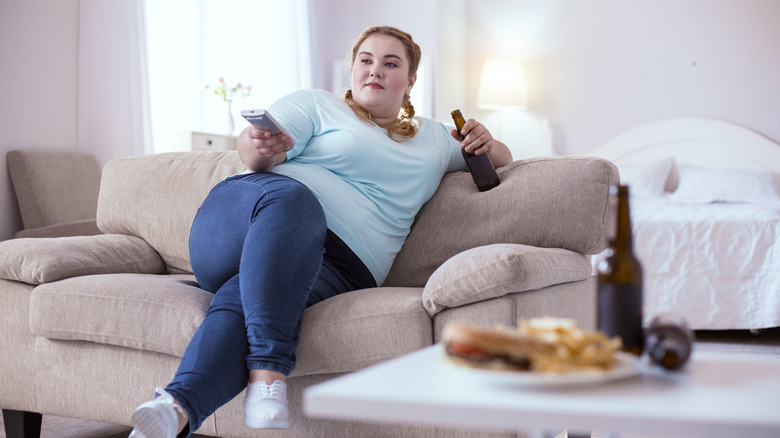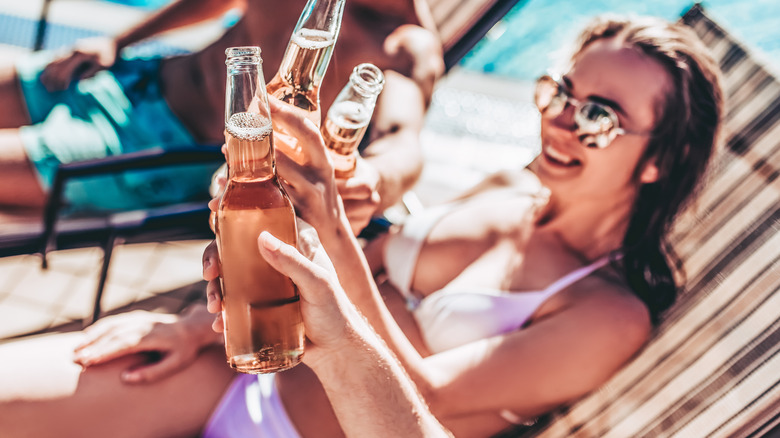The Real Reason Beer Can Make You Gain Weight
You've probably heard that beer can make you gain weight, but is it true? The answer depends on several factors, including your overall diet and how much you drink. Beer itself isn't very high in calories — one can (12.5 ounces) has about 150 calories, 12 grams of carbs, 1.6 grams of protein, and no sugars or fats, per MyFoodData. Piña colada, by comparison, boasts 340 calories, 5 grams of fat, and 44 grams of carbs, including 40 grams of added sugar, per serving (via MyFoodData).
Any alcoholic beverage has the potential to cause weight gain. Beer is no exception. First of all, it provides empty calories. It does contain small amounts of potassium, phosphorus, copper, and vitamin C, but most calories come from alcohol and carbs. One gram of carbohydrates has 4 calories, while the same amount of alcohol delivers 7 calories, according to the University of California, Los Angeles. These numbers can add up quickly, especially if you're binge drinking.
What you may not know is that beer also increases appetite, which can lead to overeating. The same goes for all alcoholic beverages, per a 2010 review published in Psychology and Behavior. As the researchers note, drinking before or with meals can make food more palatable. But is beer worse than other drinks? Read on to find out the truth about that beer belly.
Beer affects your body's ability to burn fat
Alcoholic beverages, including beer, may interfere with fat burning because your liver will break down the alcohol instead of fat or carbs for energy (via Clinical Liver Disease). Simply put, alcohol is the first fuel to burn. As a result, it will take you longer to torch the extra calories from beer and food.
Beer is also higher in carbs than other beverages, such as wine and spirits (via MyFoodData). After ingestion, carbs are converted to glucose and used for energy. Some are stored as glycogen in the liver and muscles. The liver can store up to 160 grams of glycogen, while your muscles have the ability to store anywhere between 300 and 700 grams of glycogen, per Nutrition Reviews. If your glycogen stores are already full, the extra carbs will be stored as fat, notes Columbia University's Go Ask Alice!.
What this means is that beer can make you gain weight by affecting your body's ability to burn fat. Plus, it stimulates appetite and may increase your food intake. Another drawback is that some types of beer contain added sugar, which can significantly boost the calorie count. Root beer, for example, delivers over 200 calories and 52.3 grams of carbs per can (via MyFoodData). Some varieties boast up to 320 calories per serving (12 ounces), according to the Center for Science in the Public Interest.
You can drink beer and still keep fit
Despite its carb content, beer isn't worse than other alcoholic beverages, except for cocktails and liquors. Most cocktails contain citrus-flavored sodas and other mixers high in sugar. As Mike Roussell, Ph.D., told Shape magazine, cocktail mixers can have more than double the number of calories than the actual alcohol.
Currently, there's no evidence that beer can make you gain weight when consumed in moderation (via Nutrition Reviews). If you have a belly, it's likely due to your overall diet. Also, note that men are more prone to store belly fat than premenopausal women, explains a 2019 review published in Frontiers in Physiology.
If you're trying to cut back on calories, consider switching to light beer, which has roughly 100 calories and 6 grams of carbs per can (via MyFoodData). Low-alcohol and non-alcoholic beers are low in calories, too. Either kind of brew is a better choice than regular beer, cocktails, or hard liquors. As a rule of thumb, try not to exceed 12 ounces of beer per day if you're a woman or 24 ounces per day if you're a man (via the Centers for Disease Control and Prevention).
If you or anyone you know is struggling with addiction issues, help is available. Visit the Substance Abuse and Mental Health Services Administration website or contact SAMHSA's National Helpline at 1-800-662-HELP (4357).


